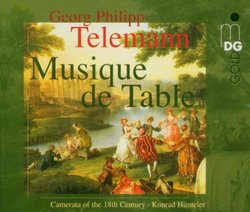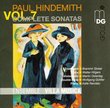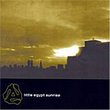| All Artists: Georg Philipp Telemann, Konrad Hunteler, Camerata of the 18th Century Title: Telemann: Musique de Table Members Wishing: 0 Total Copies: 0 Label: MD&G Records Release Date: 8/20/1996 Genre: Classical Styles: Chamber Music, Forms & Genres, Concertos, Suites, Theatrical, Incidental & Program Music, Historical Periods, Baroque (c.1600-1750), Instruments, Brass, Reeds & Winds, Strings, Symphonies Number of Discs: 4 SwapaCD Credits: 4 UPC: 760623058023 |
Search - Georg Philipp Telemann, Konrad Hunteler, Camerata of the 18th Century :: Telemann: Musique de Table
 | Georg Philipp Telemann, Konrad Hunteler, Camerata of the 18th Century Telemann: Musique de Table Genre: Classical
|
Larger Image |
CD DetailsSimilar CDs
|
CD ReviewsLeading German Baroque flutist expands conducting role Frank T. Manheim | Fairfax VA | 09/15/2005 (4 out of 5 stars) "Konrad Hünteler is among the most accomplished younger flutists born and bred in the early music circles of Germany and the Netherlands - especially Frans Brüggen's Orchestra of the 18th Century. Since his recording debut with the MGD label in 1996, Hünteler has released a dozen recordings on this label of Baroque and classical compositions involving the transverse flute. He has also appeared in eclectic recordings such as that of contemporary Baltic composers, Tüür (Estonian), Vasks, and Balakauskas (Latvian)on the Ambitus label. He participated with the late flute master, Jean-Pierre Rampal, in a notable exposition for the Smithsonian's musical instrument collection. Here Hünteler pursues his growing recording ventures as conductor of the Camerata of the 18th Century in one of the two most famous collections baroque chamber music for diverse instruments, Telemann's Tafelmusik (on 4 CDs). I earlier preferred baroque music - a favorite with me - performed in "living tradition" style over period instrument style. This was because of what seemed to me dominance of mannerisms and historical correctness over musical expression in "historically informed performance", especially by the Dutch Kuijken-Bylsma-Jaap Schroder, and the Camerata Köln school. But, as noted by author Bernard Sherman in "Inside Early Music" (Oxford, 1997), early music performance has evolved to more emotional, sensitive approaches. So now I am finding exciting nuances and new discoveries among the early music recordings. Besides superb musicianship, Hünteler's ensemble gives careful attention to Telemann's often surprising turns of harmony, rhythm, and melody. They avoid overkill in soloist volume, so the clever nuances Telemann puts into orchestral parts don't get lost as they do in some of the many recordings of Tafelmusik. My rating of 4 stars really means very good - although that may imply flawed in comparison with the preponderance of ratings that have five stars. I assume those top ratings come about because people rarely bother to rate music except what they are totally enthusiastic about. Too bad, because for me it's worth hearing about nuances in music performance and peoples' perceptions. The main thing keeping me from five stars is a certain lack of "edge" and boldness in bringing out Telemann's inspiration. Unlike Bach, in which robust melodic lines can work even if played by steam calliopes, Telemann emphasized instrumental tone color, moods, subtle melodies, and surprising twists of harmony and rhythm. In short, Telemann was a (pre)romantic and left much to individual interpretation. This means that the impact of his music can vary tremendously depending on performance." My favorite Musique de Table so far, with great sound and gr E. Weed | Houston, TX | 02/11/2006 (5 out of 5 stars) "At its best, the German label MDG produces recordings with sound quality that buries much of the competition. Good sound does not, however, necessarily come with first rate performances, nor with budget prices.
This release is an exception. It's cheaper than several of the other Musique de Tables, and the performances are fully competitive...in fact, for this listener, preferable to some of the big names. The ensemble is small (it's origins well-detailed in one of the other reviews) and tightly knit, without coming across as mechanical. In fact, there is nothing austere about either the playing or the recording...this is warm, friendly music making. Though designated by Telemann himself as, well, "dinner music," that should not be seen for a moment as indicating some lack of quality or seriousness of purpose (though I can say that it does work well as described). In fact, Part 1 in particular strikes this listener as some of Telemann's best work--memorable melodies, curious slight twists of harmony, etc. As the liner notes describe, this was music that was designed to appeal to the emotions, while avoiding excess complexity. If you don't know Telemann's work very well, this is a great place to start. If you're a hi-fi person, and you've found other period instrument recordings to be on the strident side, this set should provide real pleasure." |

 Track Listings (15) - Disc #1
Track Listings (15) - Disc #1

